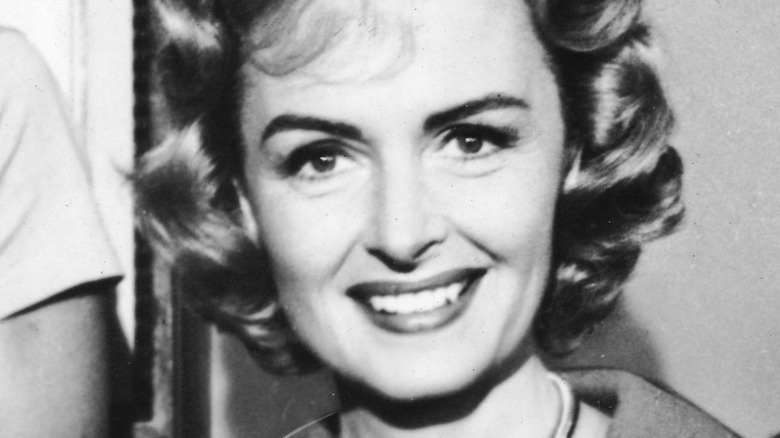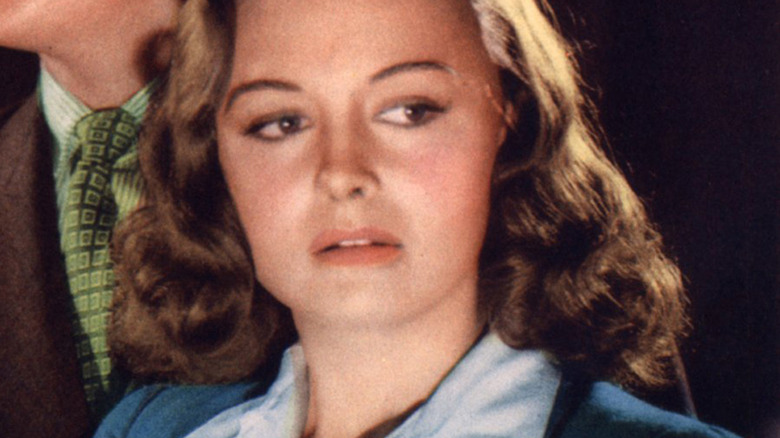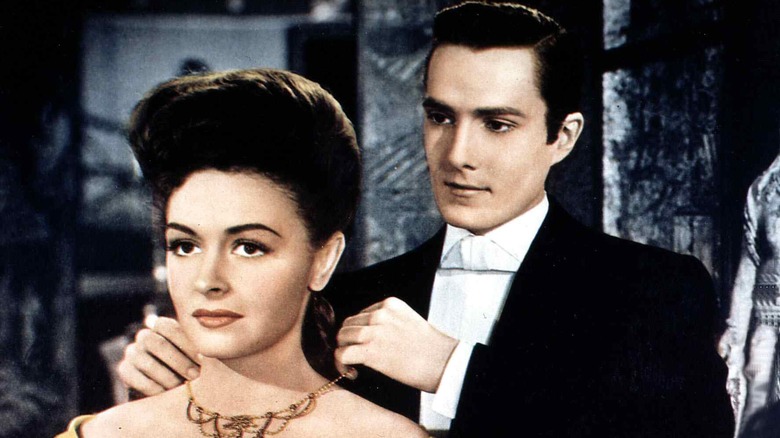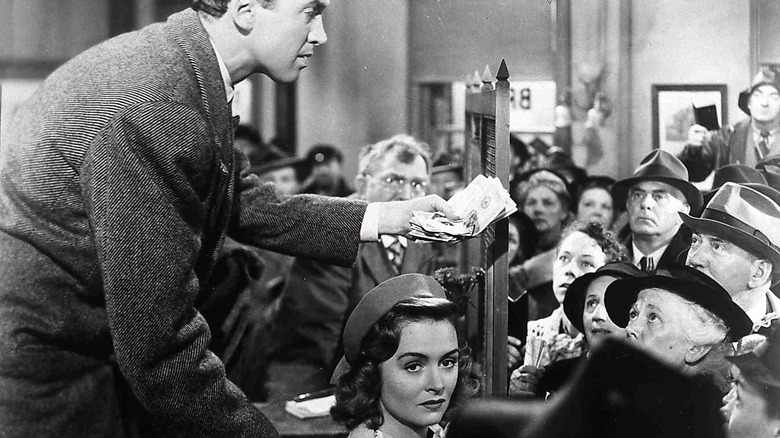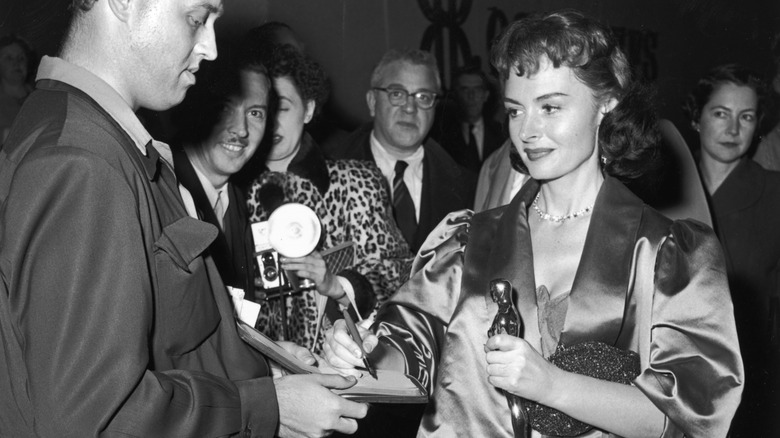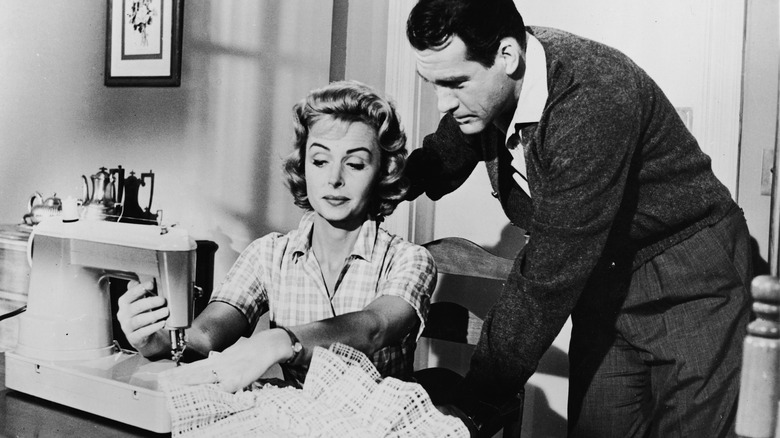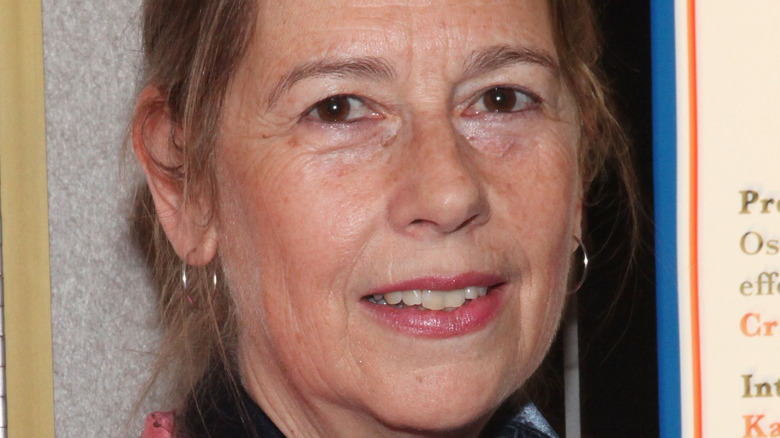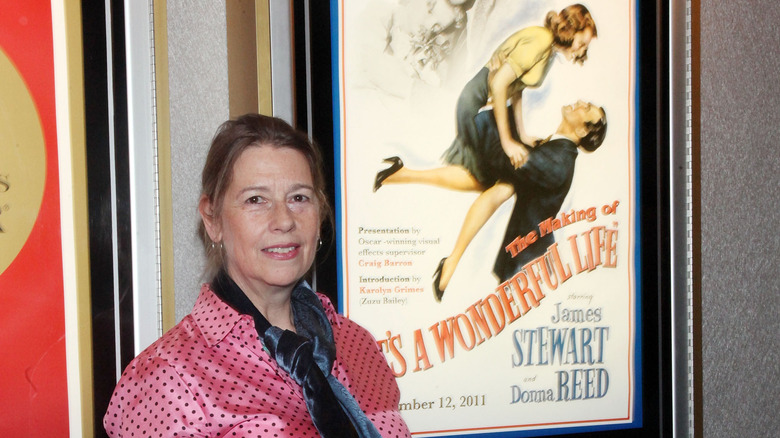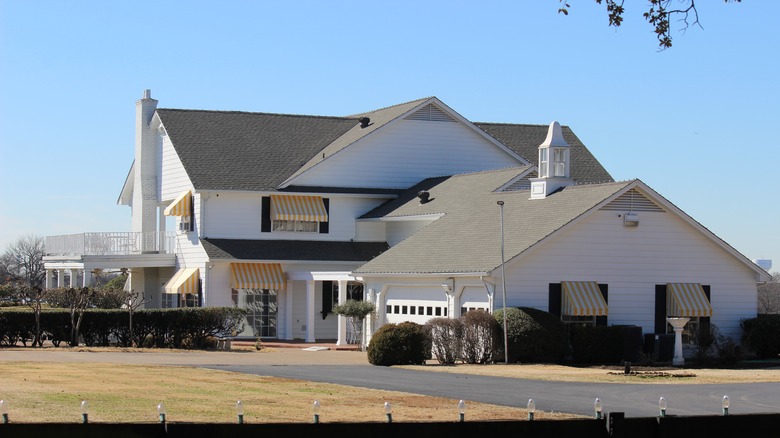Donna Reed: From Childhood To Hollywood Icon
In American culture, Donna Reed has long been associated with the stereotypical 1950s housewife: always docile, ever-supportive of her husband, and never seeking employment outside the home. Reed herself arguably invited such associations with her portrayal of Donna Stone, doting wife to Dr. Alex Stone, on "The Donna Reed Show." In fact, her former colleague Jeffrey Hayden, who directed episodes of the show for three seasons, told the Television Academy in 2010 that Reed "had her hand not only in her performance every week ... [but also] in the stories and the scripts."
Yet Reed's own childhood was not quite the suburban idyll depicted on her TV show. The actress grew up on a farm in Denison, Iowa, and while her small-town roots helped cement her girl-next-door typecasting later in life, the Great Depression was hard on Denison. In a recollection Reed published in Guideposts in 1962, she recounted how her neighbors abandoned their farms in desperation and her parents sold all the animals on their farm trying to make ends meet. "Family after family loaded their belongings into rickety automobiles and left," she wrote.
Still, Reed's own family life was free of the upheaval that often prompts aspiring actors and actresses to hop a bus to Hollywood, as historian Geoffrey Mark pointed out to Closer Weekly. Reed herself wrote about her father's belief in family bonds and faith in God as pillars of strength through difficult times.
Heading to Hollywood
According to Donna Reed's own account in Guideposts, she was fortunate enough to have an aunt out in Los Angeles who let Reed stay with her after graduating from high school so Reed could attend Los Angeles City College. Reed had $60 on her person when she set out for L.A., but once there, she quickly settled in and before long was dubbed the "Campus Queen," per Closer Weekly.
At LACC, Reed studied "stenography and office efficiency," according to The Washington Post. Whether because of the publicity surrounding the "Campus Queen" title, per Britannica, or because she began appearing in campus productions, Reed soon drew the notice of Hollywood talent scouts. That led to a contract with MGM. Reed's daughter Mary Anne Owen insisted (via Closer Weekly) that her mother "could have been a college professor" if not for the series of events at LACC beginning with the "Campus Queen" title. "It literally changed her life," Owen said.
Catching a break on the silver screen
Before long, Donna Reed was gracing the silver screen. While she is best known for "The Donna Reed Show" and the film "It's a Wonderful Life," she appeared in a laundry list of more mediocre films over the course of a decade-plus before those opportunities came her way (per IMDb). Reed's very first movie was 1941's "The Getaway," a now-forgotten film about a federal agent, an escaped convict, and the convict's sister (Reed) who tries to reform her brother and leaves the agent smitten. It was a relatively minor role in a less-than-blockbuster vehicle.
More serious movies followed, if not more substantive roles. Reed had a bit part in the Mickey Rooney-Judy Garland film "Babes on Broadway." Next, she appeared in "The Bugle Sounds," "The Courtship of Andy Hardy," and "The Man from Down Under." Then, in the mid-1940s, Reed began getting bigger roles alongside major stars: "Calling Dr. Gillespie," opposite Lionel Barrymore, and "See Here, Private Hargrove," with Robert Walker, per Britannica.
In 1945, Reed co-starred with George Sanders, Angela Lansbury, and Peter Lawford in "The Picture of Dorian Gray," a box office smash that was based upon the classic Oscar Wilde story. According to IMDb, there was no critical consensus on the film — some reviewers liked it, others panned it — but it helped to make Reed an A-list leading lady and led to her next (and perhaps most memorable) film role.
Saving Jimmy Stewart in 'It's a Wonderful Life'
"It's a Wonderful Life" is the poignant tale of a small-town man with wanderlust and big dreams who grapples with the meaning of life when the tiny hometown that needs him gets in the way of his globetrotting plans. Donna Reed played the girl-next-door character Mary Hatch, married to George Bailey, who was played by Jimmy Stewart.
When Reed starred alongside Stewart in the now-iconic film, she was only 25. On set, Stewart was reportedly nervous around Reed. And according to Reed's daughter, Stewart held Reed accountable for the movie's poor box office performance when it came out, per Closer Weekly. The two stars never acted together again. Reed didn't let that get to her, though, and she was happy to see the film become a Christmas classic in her later years. Despite its disappointing showing upon its release, "It's a Wonderful Life" withstood the test of time and landed Reed in the pantheon of classic movie stars.
Landing an Oscar-worthy role
By 1946, Reed had clearly been pigeonholed as the girl next door, but she was able to break out of that typecasting, however briefly, when she played a seasoned sex worker in 1953's "From Here to Eternity." The movie was critically acclaimed, with Variety enthusing, "It would be hard to imagine anyone else playing the characters, even though some of the assignments are off-beat to the extreme."
Included in that judgment was Reed's performance as a call girl at the New Congress Club, a fictional brothel frequented by American soldiers during World War II. Variety declared that the "change of pace" allowed Reed to show "an ability for meaty, dramatic work scarcely suspected from her previous assignments." The role would allow Reed to win an Oscar — the only Acadamy Award Reed ever won — for Best Supporting Actress in 1954, beating out Grace Kelly and Thelma Ritter, among others. "It was a wonderful experience, 'From Here to Eternity,' but I think even more wonderful is from 'Eternity' to here," Reed said in her pithy acceptance speech.
Getting her own television show
Notwithstanding that Oscar, "The Donna Reed Show," which ran from 1958 to 1966, could be Donna Reed's most enduring legacy. Set in the fictional middle-class town of Hilldale, the show was developed and produced by Tony Owen, a fellow Midwesterner and Reed's second husband, per The New York Times. Reed's sitcom rarely if ever tiptoed close to divisive topics like feminism, social inequality, race relations, and so on, preferring instead to explore issues like misplacing one's wedding ring, a teenage son's misadventures in buying a car, and a family friend's offer to use his lake house, per IMDb.
Still, Reed insisted that the show had universal appeal. She told a 1960 interviewer from the Pennsylvania newspaper Standard-Speaker (via Closer Weekly) that the show aimed to depict 1950s small-town life in places like her old hometown. "The series is more like my life might have been had I never left my hometown of Denison, Iowa," Reed said. "On the show we have our problems, laughs and, above all, our need for love and friendship."
If Reed detected any discordance in her own pursuit of a career while telling stories about a woman happy to be a homemaker, she did not seem troubled by it. And the show did provide an entertaining escape for millions during the early to mid-1960s, a time during which the Vietnam War and Civil Rights movement were gaining steam and Second Wave feminism was finding its voice.
Movement-building in the lean years after 'Donna Reed'
"The Donna Reed Show" went off the air in 1966 — the same year the National Organization for Women (NOW) launched in Washington, D.C., Martin Luther King, Jr. began speaking out against war, and America ramped up its military presence in Vietnam. Donna Reed herself, a lifelong Republican, was actually against the Vietnam War and went public with her opposition to it. She helped lead Another Mother for Peace, and her daughter told Closer Weekly that role provided a source of fulfillment for Reed while her career was on the decline.
"She just dove headfirst into that, because they rented a warehouse in Beverly Hills which was this huge place," Mary Anne Owen said. "These women were writing speeches and strategizing on how to reach across political lines."
Work-wise, Reed turned down many of the roles sent her way and didn't appear onscreen for a while after "Donna Reed" ended. "I just wouldn't do the junk I was offered," she later said, looking back on this period, according to the Los Angeles Times. "I didn't like the way films were treating women. Most of the roles were extremely passive — women in jeopardy, poor stupid souls who couldn't help themselves." Since Reed disliked the options available to her professionally, she dropped out of the workforce.
Focusing on the family
Donna Reed married three times over the course of her life and had four children with her second husband, per Closer Weekly. In some ways, her family life took off when her acting career stalled. Mary Anne, Tony Jr., Timothy, and Penny were always a priority for Reed, of course, even when she was working, but she had more time to spend with them after "The Donna Reed Show" went off the air.
Mary Anne would go on to try her luck at acting, appearing in "The Hand that Rocks the Cradle." Tony Jr. stayed in Los Angeles for a while, too, going the academic route and teaching at a community college before becoming president of the Donna Reed Foundation for the Performing Arts after his mother's death. Timothy also went into acting: his filmography includes "I'll Take You There," "Never Forget the Brave," and "The London Firm." Penny Jane, meanwhile, avoided the spotlight and public roles, so not much is known about her life.
Divorcing her children's father
What would have been unheard of for her TV housewife character — divorce — became a reality for Donna Reed after the show she had collaborated with her husband on ended and their children grew up. In 1971, she split from Tony Owen, ending 25 years of marriage.
"She and my father kind of climbed this mountain together doing the show, and then she really blossomed doing the anti-war work and really became a liberal," Mary Anne Owen told Closer Weekly. Reed's daughter pointed out that despite it being Reed's second marriage, her mother was relatively young when she married Tony, and Reed had been working "pretty much nonstop" since she joined MGM when she was 21.
Without the TV show and raising young children to hold them together, Reed and her second husband found it hard to make things work. Reed told The Morning Call (via Closer Weekly) around that time: "Getting divorced was terrible. But it was also terrible being married. You have to decide which is worse. Nothing new really happened. He didn't change and neither did I. It was always a difficult marriage. We were so different in temperament."
Returning to TV for 'Dallas'
In her later years, Donna Reed would make a triumphant return to television as part of the cast of "Dallas," the popular 1980s primetime drama about the fractious family of a Texas oil tycoon. In Season 8 of the show, Reed appeared as Miss Ellie Ewing, the matriarch of the clan.
She was replacing Barbara Bel Geddes in that role, and it would prove to be a short-lived replacement. But at the time, Reed liked the idea of playing another mother who holds her family together, her daughter told Closer Weekly. Ellie Ewing, after all, is a stand-by-your-man kind of woman who teaches her children that blood runs thicker than water (if not necessarily oil). "She was interested, again, because it was another family show and she thought that's why it was so popular," Reed's daughter said. "Not because it was a good family; it was a family, and the mother wielded a certain amount of power being the matriarch."
Filing a $7.5 million lawsuit
Whether Bel Geddes had leftover health issues (as was widely reported) or a contract dispute (as some believed), she soon returned (via Closer Weekly). Lorimar Productions, the production company behind the show, welcomed her back, writing Donna Reed out of the series a year after she'd joined it. Reed was suddenly out of a job.
In 1985, Reed sued Lorimar for breach of contract. According to the Los Angeles Times, it was originally a $7.5 million lawsuit. Reed had signed a three-year contract with Lorimar, per The New York Times, and was "mad as hell," that she had only been able to act on the series for one year. Reed eventually accepted a $1 million settlement that included the freedom to work for whomever she wanted to. But before she had a chance to find another acting role, fate intervened in the form of a devastating medical diagnosis.
Facing pancreatic cancer
In mid-1985, Donna Reed went to the hospital with ulcers. Doctors found a malignant tumor in her pancreas, per the Los Angeles Times. Then, that December, she was admitted to the hospital again, this time Cedars Sinai Medical Center, for bleeding ulcers.
Reed was only 64 years old at that point. The hospital released her "in fair condition," according to the Times, so she could spend Christmas in her Beverly Hills house with her family. She died at home on January 14, 1986, with her third husband Grover Asmus beside her — just "two weeks before her 65th birthday," per the Associated Press.
Reed was reportedly buried at Westwood Cemetery in Los Angeles. "We expected it. Her death was imminent. It was kind of rough,″ Reed's younger brother, Bill Mullenger, an Iowa real estate agent who was then 58, told the AP. "I saw her at Thanksgiving. She was about like any normal person would be when they find out they have cancer – depressed. There was not much hope of remission or that it could be treated."
Leaving a lasting legacy
Upon Donna Reed's passing, her widower Grover Asmus established the Donna Reed Foundation for the Performing Arts. It is based in Denison, Iowa, Reed's original hometown.
According to the foundation's website, it sponsors scholarships and internships for young Iowans interested in show business and holds educational workshops. Now reportedly run by Reed's son Tony Jr. (via Closer Weekly), the foundation also encourages children's musical theatre. Additionally, there is a Donna Reed Museum in Denison showcasing Reed's prizes, honors, and personal correspondences. The museum aims to pay tribute to Reed's memory while also celebrating "the lives and achievements of all Iowans," per its website.
But perhaps Reed's greatest legacies are her children and the performances that live on after her passing. It's not necessarily true that Reed's time was a simpler one. The era of her prime was addled with the anxiety of the Cold War, as Reed herself noted in Guideposts, and the social unrest of the 1960s. But the fictional worlds she helped create offered an escape from all that, and audiences can re-watch them today to find whichever Donna Reed — girl next door, wartime sex worker, or housewife and mother — they prefer to see.
